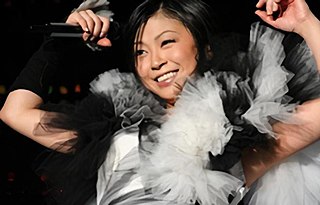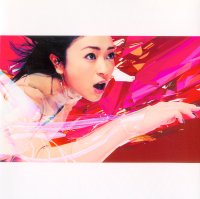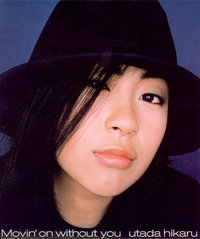
Hikaru Utada, who is also known by the mononym Utada, is a Japanese-American pop singer, songwriter and producer. Utada has become one of the most influential and best-selling musical artists in Japan.

First Love is the debut Japanese-language studio album by Japanese-American recording artist Hikaru Utada, released on March 10, 1999, by Toshiba-EMI.

"Passion" is a song recorded by Japanese-American singer Hikaru Utada, taken as the fourth single from their studio album Ultra Blue (2006). It premiered on December 14, 2005, in two physical formats and for digital consumption, distributed by EMI Japan and EastWorld. "Passion", alongside its English counterpart "Sanctuary", were used as the national and international theme songs to the Square Enix video game Kingdom Hearts II (2005); the tracks serve as the successors to "Hikari" and its English counterpart, "Simple and Clean", which are found on Kingdom Hearts.

"Be My Last" is Hikaru Utada's 14th Japanese single, released on September 28, 2005. It was used for the 2005 film Spring Snow, an adaptation of the 1966 Yukio Mishima novel of the same name.

"Hikari" is a song recorded by Japanese–American recording artist Hikaru Utada for her fourth studio and third Japanese language album, Deep River (2002). It premiered on March 20, 2002, as the third single from the album in Japan. It was written and composed by Utada, whilst production and arrangement was handled by Utada, her father Teruzane Utada, and long-time collaborator Miyake Akira. The single, and a remix by Russell McNamara, was used as the official Japanese theme song for the 2002 action role-playing video game Kingdom Hearts, and appeared on its original soundtrack respectively. Musically, "Hikari" is a pop folk song. Lyrically, it is about mysteries in life and human activities.

"Traveling" is a song recorded by Japanese–American recording artist Hikaru Utada. It was released as the second single from her fourth studio and third Japanese language album, Deep River (2002). The track was written and composed by Utada, whilst production was handled by Utada, her father Teruzane Utada, and long-time collaborator Akira Miyake. Musically, "Traveling" is a dance-pop song, influenced by house music. Lyrically, it discusses human activities and dreams.

"Wait & See (Risk)" is a song recorded by Japanese–American singer Hikaru Utada for her third studio and second Japanese language album, Distance (2001). It was released on April 19, 2000 as the second single from the album in Japan. It was written and composed by Utada, whilst production and arrangement was handled by Utada and American duo Jimmy Jam & Terry Lewis. The single also included the two B-side tracks, "Hayatochiri" and "Fly Me to the Moon ", with the former song appearing on the parent album. Musically, "Wait & See (Risk)" is an R&B song, influenced by dance-pop and rock.

"Addicted to You" is a song by Japanese-American recording artist Hikaru Utada from her second studio album Distance (2001). It was released as the album's lead single on September 6, 1999 by EMI Music Japan. "Addicted to You" was written by Utada and produced by Jimmy Jam & Terry Lewis; this is Utada's first collaboration with American producers and composers. The single artwork was shot by American photographer Richard Avedon and features two black-and-white figures of Utada. Musically, "Addicted to You" is an R&B song.

"Movin' On Without You" is a song recorded by Japanese–American singer and producer Hikaru Utada taken from their debut studio album First Love (1999). The song was written, arranged, and produced by Utada themselves, and it became their first ever hit. "Movin' On Without You" was written, produced and composed while Utada was attending college in Tokyo, Japan, during 1997. Utada, who received a record contract by Toshiba-EMI, had written an English-language version of the song, but the song remains unreleased.

"Final Distance" is a song by Japanese recording artist Hikaru Utada for her third studio album Deep River (2002). Written by Utada herself, the song was produced and composed by long-time collaborators Akira Miyake, Utada's father Teruzane Utada and herself. "Final Distance" was originally recorded as "Distance" which was taken from the album with the same name, despite not being a single. The song was re-recorded, re-arranged, and dedicated to Rena Yamashita, a six-year-old victim of the Osaka school massacre who had written an essay about being inspired by Utada.

"Boku wa Kuma" is a song by Japanese singer-songwriter Hikaru Utada, serving as their 17th Japanese single and 24th single overall. The single was released on November 22, 2006, following the release of their previous studio album, Ultra Blue (2006). It came two months after the conclusion of Utada's United 2006 tour.

"Flavor of Life" is Hikaru Utada's 18th Japanese single. The physical single was officially released on February 28, 2007.

"Beautiful World" is a song by Japanese musician Hikaru Utada. It served as the theme song for Evangelion: 1.0 You Are (Not) Alone, the 2007 film reboot of the anime Neon Genesis Evangelion. It was released as a double A-side single on August 29, 2007 along with their song "Kiss & Cry", which had been released digitally three months earlier. In 2009, a remix of the song, "Beautiful World " served as the theme song of the second film in the series, Evangelion: 2.0 You Can (Not) Advance.

"Kiss & Cry" is a song recorded by Japanese recording artist Hikaru Utada for their seventh studio and fifth Japanese album, Heart Station (2007). It was written, composed, and arranged by Utada, whilst production was handled by Utada, their father Teruzane Utada, and Akira Miyake. The single premiered on May 31, 2007 as the third single from the album in Japan. It was re-released as a double A-side single with "Beautiful World", which also appeared on the parent album on August 29 in Japan, and digitally worldwide. Musically, "Kiss & Cry" is an R&B song, influenced by pop and hip-hop music. Lyrically, it discusses both Utada's upbringing and social beliefs between both Western and oriental regions.

Heart Station is the seventh studio and fifth Japanese-language album by Japanese–American recording artist Hikaru Utada. It was released on March 19, 2008 by EMI Music in Japan, and globally on March 26, 2008. It is Utada's eighth consecutive studio album to be fully written and produced by her, with the help of her father Teruzane Utada and long-time collaborator Miyake Akira through the production. Recorded between 2006 and 2008, it was worked on whilst she was recording her ninth studio and second English-language studio album, This Is the One (2009). With the album artwork photographed by Japanese photographer Mitsuo, Heart Station was released in two formats: a physical CD, and as a digital download.

"Automatic" is a song recorded by Japanese–American singer Hikaru Utada, taken as the lead single from her debut album First Love (1999). It was released on December 9, 1998, through Toshiba-EMI in three physical formats: mini CD single, standard-size CD single and 12" vinyl. Additionally, the single included the A-side "Time Will Tell", which originally served as the B-side for these versions. The song was written and co-produced by Utada, while Akira Miyake and the singer's father Teruzane Utada served as producers. Despite working recording in English under the name Cubic U, "Automatic" is Utada's first Japanese recording, and was released after she enrolled into high school in Japan.

Utada Hikaru Single Collection Vol. 2 is Japanese pop singer-songwriter Hikaru Utada's second compilation album, released on November 24, 2010, by EMI Music Japan, the same day as her Universal-released English language compilation album, Utada the Best. The album includes two discs, with the first being a 13-track greatest hits album spanning 2004–2009, while the second is an extended play featuring new material. Along with Utada the Best, this remained Utada's last album release for six years, until 2016's Fantôme, due to an announced hiatus. Several of the new songs achieved commercial success, with "Goodbye Happiness" reaching number one on Billboard's Japan Hot 100 chart, and "Can't Wait 'Til Christmas" reaching number one on the Recording Industry Association of Japan's digital track chart. Both songs have been certified by the association as gold records for full-length cellphone downloads.
"Can't Wait 'Til Christmas" is a song by Japanese singer-songwriter Hikaru Utada. It was released on Utada's second Japanese compilation album, Utada Hikaru Single Collection Vol. 2, on November 24, 2010.

"Time Will Tell" is a song recorded by Japanese–American singer Hikaru Utada, taken as the lead single from their debut album First Love (1999). It was released on December 9, 1998, through Toshiba-EMI in three physical formats: mini CD single, standard CD single and 12" vinyl. Additionally, the single was originally served as a B-side to "Automatic", but was changed into an A-side. The song was written and co-produced by Utada themself, while Akira Miyake and the singer's father Teruzane Utada served as producers. Despite working recording in English under the name Cubic U, "Time Will Tell" is Utada's first Japanese recording, and was released after they enrolled into high school in Japan.

"Letters" is a song by Japanese musician Hikaru Utada. It was released as a double A-side single with the song "Sakura Drops" on May 9, 2002.

















